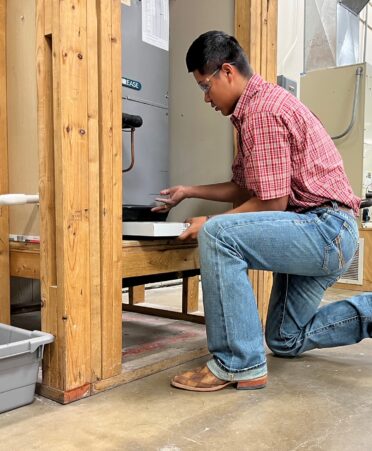(WACO, Texas) – Texans adore their air conditioning and heating systems, and they will do whatever is needed to ensure that they work properly.
February is National Care About Your Indoor Air Month, a time to check ducts, filters and vents to make sure that there are no hindrances in generating air.
Tim Snyder, lead instructor in Texas State Technical College’s HVAC Technology program at the Waco campus, said most consumers’ HVAC systems require standard pleated filters. Sizes can start at 16 in. x 25 in. x 1 in.
“Don’t try to upgrade your filter because it will hinder airflow,” Snyder said.
He recommended that consumers change out filters quarterly. He said having pets can mean replacing them more frequently.
Some of the factors that the U.S. Environmental Protection Agency (EPA) attributes to indoor air pollution include asbestos-containing insulation, excess moisture, and tobacco products.
Some consumers rely on purifiers, or portable air cleaners, to clean up the air inside residences. Some portable air cleaners have separate filters for gases and particles. The equipment needs to have a clean air delivery rate that is compatible with the size of the room. Consumers can look for portable air cleaners that are certified by ENERGY STAR, an EPA program that promotes energy efficiency, and those that are approved by the Association of Home Appliance Manufacturers.
Portable air cleaners can provide some aid in cardiovascular and respiratory health, according to the EPA.
Snyder said if consumers smell odors coming from their HVAC systems, it is time to call a technician. He said some companies will clean air duct systems.
Some of the tasks that technicians should perform when working on HVAC units include cleaning and checking condenser and evaporator coils, looking at thermostat collaboration and examining airflow, according to the Better Business Bureau serving the Heart of Texas. All estimates for work should be given to the consumer in writing.
TSTC offers an Associate of Applied Science degree in HVAC Technology and certificates of completion in HVAC Technician, HVAC Technology, and HVAC Residential Service Technician. The program also offers an occupational skills achievement award in Basic HVAC.
For more information on TSTC, go to tstc.edu.
